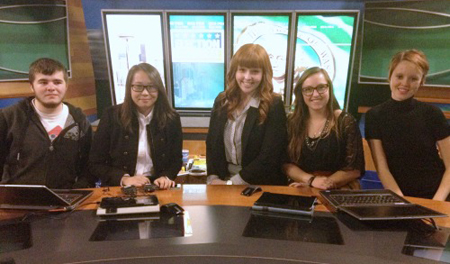Page 37 • (930 results in 0.037 seconds)
-
movement. In David Martin’s 1776 portrait of Belle alongside her cousin Lady Elizabeth Murray, Belle cannot escape Martin’s exoticizing brush, which swoops in to flourish her with tropical fruit. In Sanditon, viewers see fruit serving a political significance as well, with pineapples being used in connection with Georgiana’s goal to rally community support for abolition in both seasons of the series. Taking these details into consideration, the Martin’s foregrounding of a white woman and a Black woman
-
they need to bridge the political divide in their everyday lives; founder and CEO of Reclaim Curiosity, an organization working to build a more curious world; cofounder of the award-winning Seattle newsletter The Evergrey; and advisor for Starts With Us and the Generations Over Dinner project. She was a 2019 fellow at the Henry M. Jackson Foundation, where she studied social and political division, and a 2016 fellow at the Nieman Foundation for Journalism at Harvard University, where she researched
-
, Marriage, and Homosexuality in the Eastern Orthodox Church” ” Lucas Kulhanek, “‘You Fool!’: A Postcolonial Biblical Analysis of the Parable of the Rich Fool” Michael McMullen, “Dietrich Bonhoeffer, Anti-Semitism, and Martin Luther” Erin Parks, “Dropping the Crystal Goblet: Evangelical Complementarian Responses to Domestic Abuse” Glenroy Sandy, “The Old Rugged Cross” Connor Scott, “Matthew’s Use of Allegory to Challenge Jewish Leaders”2013Tyler Bieker, When the Saints Go Marching In: The Political and
-
social and cultural impact of video games in American history, including how historical figures and events have been represented in popular games during the past 40 years. Combines the study of visual media theories and the creative process with social and political issues in games, including ethical action, violence, gender, ethnicity, religion, and environmental concerns. (4) HIST 210 : Contemporary Global Issues: Migration, Poverty, and Conflict - ES, GE This course introduces students to central
-
strong communication skills (particularly writing), all of which are critical to success today and in the future. It’s not surprising that a recent survey by the Association of American Colleges and Universities shows that more than three-quarters of employers would recommend an education with this emphasis. All successful careers require critical thinking, teamwork, sensitivity to cultural, demographic, economic and societal differences and political perspectives, all provided by a liberal arts
-

’15 and Cassady Counter ’14, worked the night at various sites for the News Tribune and added their accounts of the night’s activities to the News Tribune Political Buzz blog. “It was pretty successful for us considering it was a slow election year,” Jorgenson said. Matt Misterek, Team Leader and student supervisor at the News Tribune, said the Tribune was glad to have the students contributing on election night. “They did well, especially on the early tweets. We retweeted a lot of their info
-
are now 193 counties following a labyrinth of political systems and economic models, and a global population that now exceeds 7 billion. Just as the symposium reaches out to challenge the assumptions and understanding of the PLU campus community, so too is it intended to reach out to the broader Puget Sound Community. Previous symposia have been Migration: Towards an Interdisciplinary and Cross-Cultural Understanding of Human Mobility, The Countenance of Hope: Towards an Interdisciplinary and
-
Relations) 2014-2015: Lauren Mendez (Political Science) 2015-2016: Maria Cruse (Women’s & Gender Studies) 2016-2017: Olivia Ejeguru (Chemistry) 2017-2019: Lotte Duran (Women’s & Gender Studies) 2018-2019: Dejan Perez (Women’s & Gender Studies) 2019-2020: Natalia Giovengo (English)
-
Part X. – OTHER FACULTY POLICIES Section V. – SPECIAL INSTITUTIONAL POLICIES AND PROCEDURES Part I. – COPYRIGHT LAW AND EDUCATIONAL FAIR USE Part II. – FAMILY EDUCATIONAL RIGHTS AND PRIVACY ACT OF 1974 (FERPA) Part III. – APPLYING FOR INTERNAL AND EXTERNAL FUNDING Part IV. – INCLUSIVE LANGUAGE Part V. – POLICY FOR DEALING WITH AND REPORTING POSSIBLE MISCONDUCT IN SCIENCE Part VI. – POLICY ON POLITICAL ACTIVITIES Part VII. – POLICY ON RELIGIOUS GROUPS Part VIII. – SPEAKER POLICY Section VI
-
JeterThe Impact of Diaspora Activism on the Authoritarian Regime of Equatorial Guinea2:30-3:00 - Alina BoorseBeyond the Brochure: Examining the Impact of Voluntourism Marketing on African Development3:00-3:15 Break3:15-3:45 pm - Madelynne Jones3:45-4:15 - Kaden Bolton4:15-4:30 pm - Sydney Tembo3:15-3:45 pm - Madelynne JonesA Review: America's Policy on Nuclear Energy3:45-4:15 - Kaden BoltonThe ``Chinese Virus``: Political Sinophobia and Its Consequences4:15-4:30 pm - Sydney TemboThe Other Language of
Do you have any feedback for us? If so, feel free to use our Feedback Form.


